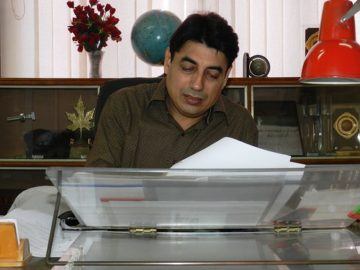Ather Farouqui in Maeeshat:
 Hindi—the original name of the language now known as Urdu—and modern Hindi are two distinct languages. Despite being a fairly new language, notions regarding Urdu’s origins and history are as hotly debated amongst the public at large as among scholars and linguists. Interestingly, the name Urdu gained currency circa 1857, with the formal cessation of Mughal rule. Hindi was the name commonly used until the second decade of the 20th century by none other than Iqbal, a poet whose poetry is overtly Islamic. His use of ‘Hindi’, instead of ‘Urdu’, gives lie to determined efforts, after the establishment of the Muslim League in 1903, to paint Urdu as the language of Muslims, as opposed to modern Hindi as the language of Hindus. Urdu would then be utilised to mobilise Muslim support for a new country. The publication of Shamsur Rahman Faruqi’s seminal work, Urdu ka Ibtedaee Zamana: Adabi Tarikh o Tahzib ke Pahlu (1999), followed by its original English version (Early Urdu Literary Culture and History [2001]), compelled the revision of many current and honoured notions about early Urdu and its literary culture. In many ways, it was a pioneering work which needs to be revisited. The book demolished myths and assumptions about the early history of the language as it developed in and around Delhi from the late 17th century onwards. It provided new information—not yet challenged—about the origin of the language name ‘Urdu’, and many other aspects of Urdu’s literary history.
Hindi—the original name of the language now known as Urdu—and modern Hindi are two distinct languages. Despite being a fairly new language, notions regarding Urdu’s origins and history are as hotly debated amongst the public at large as among scholars and linguists. Interestingly, the name Urdu gained currency circa 1857, with the formal cessation of Mughal rule. Hindi was the name commonly used until the second decade of the 20th century by none other than Iqbal, a poet whose poetry is overtly Islamic. His use of ‘Hindi’, instead of ‘Urdu’, gives lie to determined efforts, after the establishment of the Muslim League in 1903, to paint Urdu as the language of Muslims, as opposed to modern Hindi as the language of Hindus. Urdu would then be utilised to mobilise Muslim support for a new country. The publication of Shamsur Rahman Faruqi’s seminal work, Urdu ka Ibtedaee Zamana: Adabi Tarikh o Tahzib ke Pahlu (1999), followed by its original English version (Early Urdu Literary Culture and History [2001]), compelled the revision of many current and honoured notions about early Urdu and its literary culture. In many ways, it was a pioneering work which needs to be revisited. The book demolished myths and assumptions about the early history of the language as it developed in and around Delhi from the late 17th century onwards. It provided new information—not yet challenged—about the origin of the language name ‘Urdu’, and many other aspects of Urdu’s literary history.
…Urdu speakers suffered marginalisation, followed by alienation after Partition. The slogan ‘Hindu–Hindi–Hindustani’ was concocted in the early part of the 20th century and this helped reinforce the specious belief that Hindi was the language of Hindus and Urdu was, or ought to be, the language of Muslims. Tragically, no one—Hindu or Muslim—opposed the spurious name Urdu for the language then called Hindi/Rekhta. Public opinion in India at that time was not at all conscious, even dimly, of the consequences of this new baptism. A large number of Muslims, and some Hindus, opposed the creation of Hindi as a new language, but the matter rapidly became politicised.
More here.
